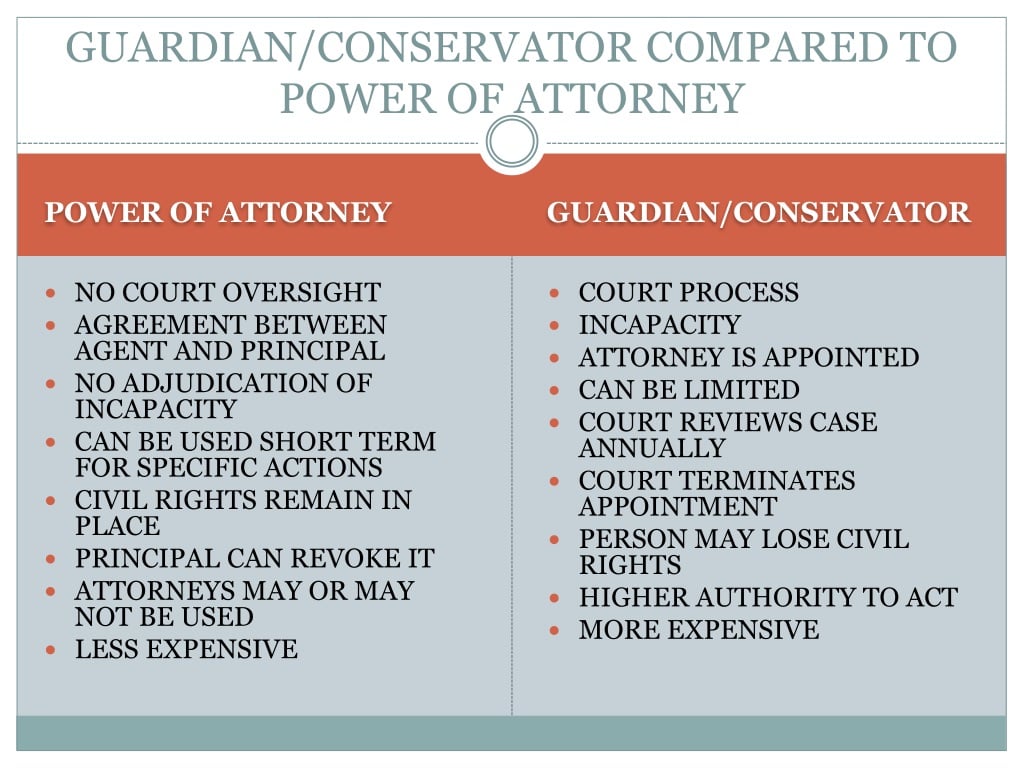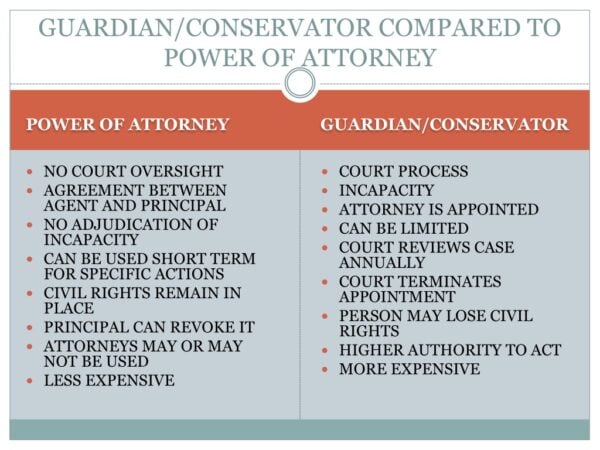
Legal Definitions

The legal definitions of a guardian and a power of attorney are essential to understand in order to differentiate between these two roles. A guardian is an individual appointed by a court to manage the affairs of a person who is considered legally incompetent, such as a minor child or an adult with a disability. A power of attorney, on the other hand, is a legal document that gives another person the authority to act on behalf of the principal in specific matters, such as financial or medical decisions.
Guardianship
Guardianship is a legal relationship that is established by a court order. The guardian has the authority to make decisions on behalf of the ward, including decisions about the ward’s personal care, medical treatment, and financial affairs. Guardianship can be temporary or permanent, depending on the circumstances.
Power of Attorney
A power of attorney is a legal document that gives another person the authority to act on behalf of the principal. The power of attorney can be limited to specific matters, such as financial or medical decisions, or it can be general, giving the agent broad authority to act on the principal’s behalf. The power of attorney is only valid if the principal is mentally competent at the time it is created.
Key Differences
The key differences between a guardian and a power of attorney are as follows:
- Appointment: A guardian is appointed by a court, while a power of attorney is created by the principal.
- Authority: A guardian has broad authority to make decisions on behalf of the ward, while a power of attorney only gives the agent authority to act in specific matters.
- Duration: Guardianship can be temporary or permanent, while a power of attorney is only valid if the principal is mentally competent at the time it is created.
Authority and Responsibilities
A guardian and a power of attorney (POA) are both legal arrangements that give someone the authority to make decisions on behalf of another person. However, there are some key differences between the two roles.
A guardian is appointed by a court to make decisions for someone who is considered legally incapacitated. This could be due to a mental or physical disability, or because the person is a minor. A POA, on the other hand, is created by a person who is still legally competent. The POA can specify which powers the agent has, and can be either general or limited.
Authority of a Guardian
A guardian has the authority to make all decisions for the person they are appointed to represent. This includes decisions about medical care, finances, and personal care.
Authority of a Power of Attorney
The authority of a POA is limited to the powers that are specified in the document. This could include the power to manage finances, make medical decisions, or sell property.
Scope of Authority
The scope of authority for a guardian is much broader than the scope of authority for a POA. This is because a guardian is appointed by a court to make decisions for someone who is considered legally incapacitated. A POA, on the other hand, is created by a person who is still legally competent. This means that the POA can only specify powers that the person creating the document is legally allowed to delegate.
Appointment Process
The appointment of a guardian and the granting of a power of attorney are two distinct legal processes with different requirements and considerations.
Appointment of a Guardian
The appointment of a guardian is a legal process that gives someone the authority to make decisions for an individual who is deemed incapable of making their own decisions due to a physical or mental disability.
- Legal Requirements: The legal requirements for appointing a guardian vary from state to state. In general, a petition must be filed with the court, and the court will hold a hearing to determine if a guardian is necessary.
- Considerations: When appointing a guardian, the court will consider factors such as the individual’s age, disability, and wishes, as well as the suitability of the proposed guardian.
Granting a Power of Attorney
A power of attorney is a legal document that gives someone the authority to act on behalf of another person. The person who grants the power of attorney is known as the principal, and the person who receives the power of attorney is known as the agent.
- Legal Requirements: The legal requirements for granting a power of attorney vary from state to state. In general, the principal must be of sound mind and body and must sign the document in the presence of a notary public.
- Considerations: When granting a power of attorney, the principal should consider factors such as the scope of the authority they wish to grant, the trustworthiness of the agent, and the duration of the power of attorney.
Duration and Termination
The duration of a guardianship and a power of attorney can vary depending on the specific circumstances and the laws of the jurisdiction.
A guardianship typically lasts until the ward (the person under guardianship) regains capacity or until the guardian is discharged by the court. In some cases, a guardianship may be permanent if the ward is unlikely to ever regain capacity.
Power of Attorney
A power of attorney typically lasts until the principal (the person who granted the power of attorney) revokes it or becomes incapacitated. However, some powers of attorney are designed to “spring into action” only if the principal becomes incapacitated.
Termination
Both guardianships and powers of attorney can be terminated in a number of ways, including:
- The ward or principal regains capacity.
- The guardian or agent is discharged by the court or the principal.
- The guardian or agent dies or becomes incapacitated.
- The guardianship or power of attorney is revoked by the ward or principal.
Ethical and Practical Considerations

When considering guardianship or power of attorney, it is essential to be aware of the ethical and practical implications. These roles involve significant responsibilities and require careful thought and preparation.
Ethical considerations include the potential for conflicts of interest, the duty to act in the best interests of the person you are representing, and the need to respect their autonomy and wishes.
Choosing and Working with a Guardian or Power of Attorney
Selecting the right person for these roles is crucial. Consider their trustworthiness, competence, and compatibility with the individual they will be representing. Open communication and regular reporting are essential for maintaining transparency and accountability.
Common Challenges and Pitfalls
- Lack of communication: Open communication is crucial to avoid misunderstandings and ensure the person’s wishes are respected.
- Financial mismanagement: Guardians and power of attorney have a fiduciary duty to manage financial resources responsibly.
- Conflicts of interest: The person appointed may have their own interests that conflict with the individual they are representing.
- Abuse of power: It is essential to safeguard against the potential for abuse of authority.
Examples and Case Studies

Guardianship and power of attorney are legal mechanisms used in various situations to protect and manage the affairs of individuals who are unable to do so themselves. Here are some examples and case studies that illustrate the practical application of these roles.
Guardianship
Guardianship is typically established when an individual is deemed incompetent or incapacitated due to mental illness, intellectual disability, or physical limitations. In such cases, a guardian is appointed by the court to make decisions on behalf of the ward, ensuring their well-being and protecting their interests.
- Case Study: A 75-year-old woman with advanced dementia is no longer able to manage her finances or make decisions regarding her healthcare. Her family petitions the court to appoint a guardian to oversee her affairs and ensure her safety and well-being.
- Example: A young adult with an intellectual disability requires support in making decisions about their education, employment, and social life. A guardian is appointed to assist them in these areas, ensuring their rights and interests are protected.
Power of Attorney
Power of attorney is a legal document that grants an individual (the agent) the authority to act on behalf of another person (the principal). This arrangement is often used when the principal is temporarily or permanently unable to manage their own affairs due to illness, travel, or other circumstances.
- Case Study: A business owner is going on an extended overseas trip and needs someone to handle their financial affairs in their absence. They grant power of attorney to their accountant to manage their bank accounts, pay bills, and sign contracts on their behalf.
- Example: An elderly couple appoints their adult child as their power of attorney to make healthcare decisions on their behalf in the event they become incapacitated.
Comparison Table
A comparison table for Guardianship and Power of Attorney is provided below to illustrate their key differences and similarities:
The table includes the following columns: Legal Definition, Authority, Duration, and Ethical Considerations.
Legal Definition
| Guardianship | Power of Attorney | |
|---|---|---|
| Legal Definition | A legal relationship in which one person (the guardian) is appointed by a court to make decisions for another person (the ward) who is unable to do so due to incapacity. | A legal document that gives one person (the agent) the authority to act on behalf of another person (the principal) in financial or healthcare matters. |
Authority
| Guardianship | Power of Attorney | |
|---|---|---|
| Authority | Broad authority to make personal and financial decisions for the ward, including healthcare, living arrangements, and legal matters. | Limited authority to act on behalf of the principal in specific matters as Artikeld in the power of attorney document. |
Duration
| Guardianship | Power of Attorney | |
|---|---|---|
| Duration | Typically lasts until the ward regains capacity or passes away. | Remains in effect until revoked by the principal or upon the principal’s incapacity or death. |
Ethical Considerations
| Guardianship | Power of Attorney | |
|---|---|---|
| Ethical Considerations | Strong emphasis on protecting the ward’s best interests and preventing abuse. | Requires the agent to act in the principal’s best interests and avoid conflicts of interest. |





